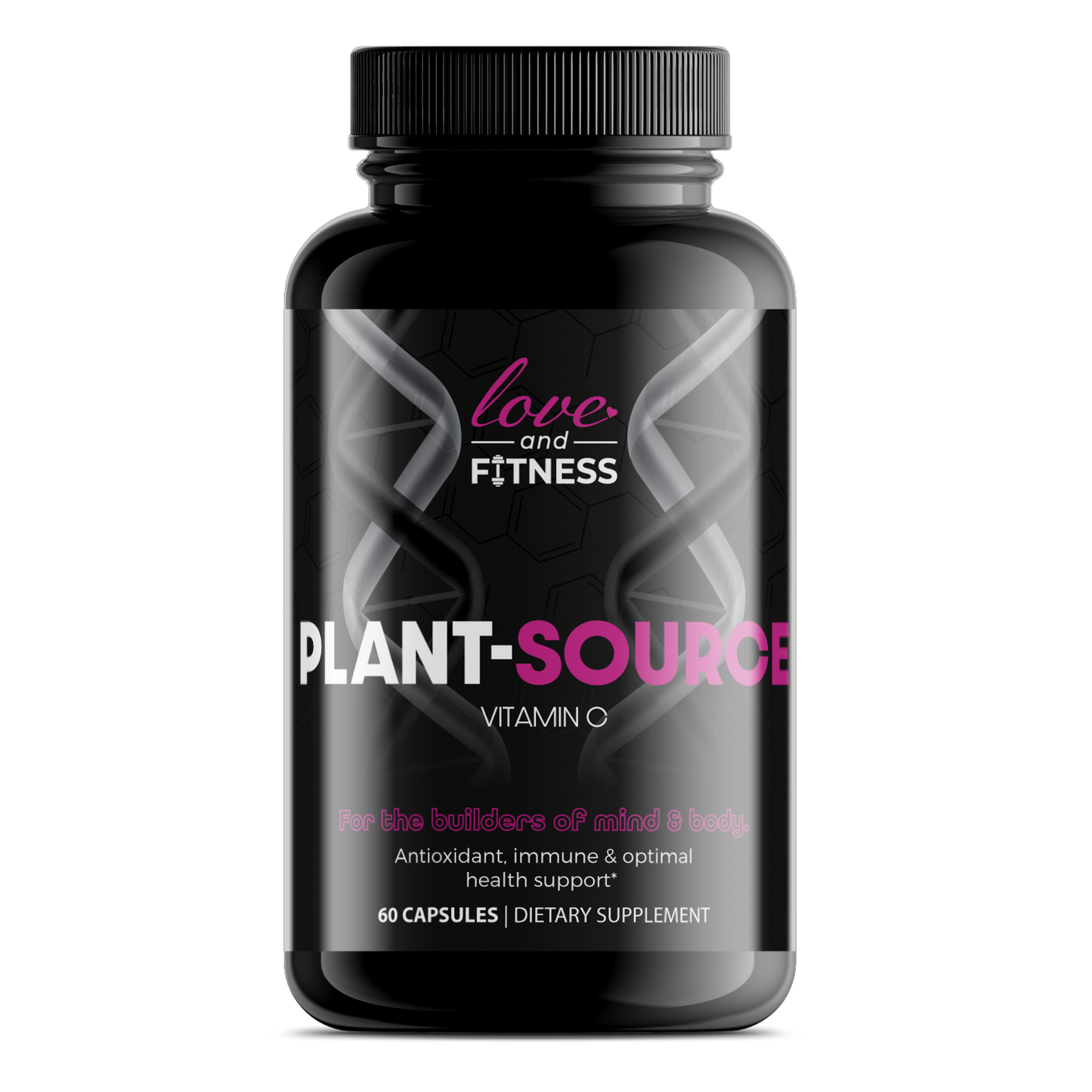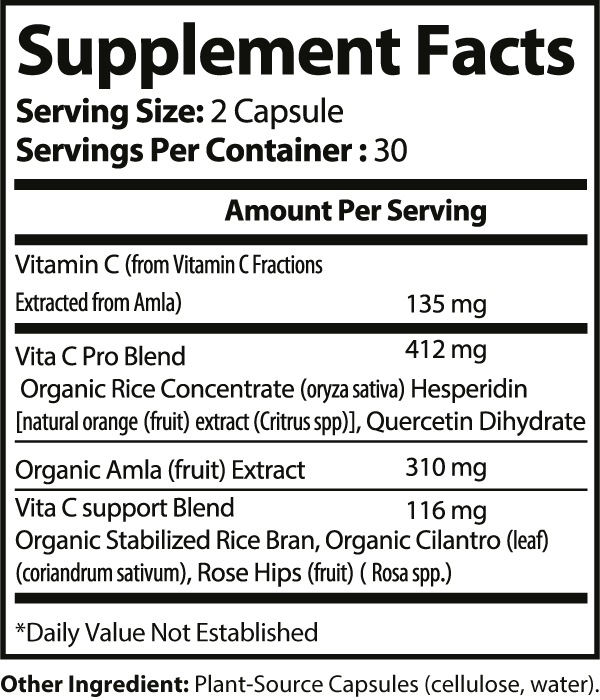Medical Grade Supplement Line
Plant Source Vitamin C
Plant Source Vitamin C
Couldn't load pickup availability
|
Formula Purposes & Benefits |
|
Plant Source Vitamin C is developed based on cutting-edge scientific research and expert formulation to support immune health, cardiovascular health, skin health, cognitive health, fat burning, increased collagen production, and digestive health, Love and Fitness’s Plant Source Vitamin C stands apart from synthetic alternatives by utilizing organic Amla, a fruit extract rich in plant-based vitamin C. Combined with co-botanicals like organic cilantro, rose hips, hesperidin extract, and quercetin, our formula offers a powerhouse of antioxidant support and immune-boosting benefits. The physiological synergy between Amla's bioflavonoid constituents and vitamin C content enhances its effectiveness, surpassing ascorbic acid. Our formula is proudly made in the USA in an FDA registered facility, following Good Manufacturing Practices (GMP) standards. Our commitment to excellence is reflected in the fact that only 4% of the supplements on the market can match our world-class standards. |
|
Formula Ingredient Deck |
Benefits Of Each Ingredient |
|
Vitamin C (as Organic Alma Berry) |
|
|
Quercetin dihydrate |
|
|
Hesperidin
|
|
|
Cilantro |
|
|
Rose Hips |
|
|
Our Formula |
Vs Other Formulas on the Market. |
|
1.Our formula is GMP certified and made in an FDA registered facility. |
1. Source cheap ingredients from heavily polluted soils. |
|
2. High quality in a bioavailable and efficaciously dosed formula.
|
2. Uses cheap that may have heavy metals due to poor product quality and lack of third-party lab testing for heavy metals.
|
|
3. Uses bioavailable sources of plant sourced Vitamin C. |
3.Uses cheap synthetic Vitamin C and claims to be beneficial for health. |
97. Carr, A. C., & Maggini, S. (2017). Vitamin C and Immune Function. Nutrients, 9(11), 1211. https://doi.org/10.3390/nu9111211
98. DePhillipo, N. N., Aman, Z. S., Kennedy, M. I., Begley, J. P., Moatshe, G., & LaPrade, R. F. (2018). Efficacy of Vitamin C Supplementation on Collagen Synthesis and Oxidative Stress After Musculoskeletal Injuries: A Systematic Review. Orthopaedic journal of sports medicine, 6(10), 2325967118804544. https://doi.org/10.1177/2325967118804544
113. Aucoin, M., Cooley, K., Saunders, P. R., Cardozo, V., Remy, D., Cramer, H., Neyre Abad, C., & Hannan, N. (2020). The effect of quercetin on the prevention or treatment of COVID-19 and other respiratory tract infections in humans: A rapid review. Advances in integrative medicine, 7(4), 247–251. https://doi.org/10.1016/j.aimed.2020.07.007
114. Sahebkar A. (2017). Effects of quercetin supplementation on lipid profile: A systematic review and meta-analysis of randomized controlled trials. Critical reviews in food science and nutrition, 57(4), 666–676. https://doi.org/10.1080/10408398.2014.948609
115. Mohammadi-Sartang, M., Mazloom, Z., Sherafatmanesh, S., Ghorbani, M., & Firoozi, D. (2017). Effects of supplementation with quercetin on plasma C-reactive protein concentrations: a systematic review and meta-analysis of randomized controlled trials. European journal of clinical nutrition, 71(9), 1033–1039. https://doi.org/10.1038/ejcn.2017.55
116. Sahebkar A. (2017). Effects of quercetin supplementation on lipid profile: A systematic review and meta-analysis of randomized controlled trials. Critical reviews in food science and nutrition, 57(4), 666–676. https://doi.org/10.1080/10408398.2014.948609
398. Cavalera, M., Axling, U., Berger, K., & Holm, C. (2016). Rose hip supplementation increases energy expenditure and induces browning of white adipose tissue. Nutrition & metabolism, 13, 91. https://doi.org/10.1186/s12986-016-0151-5
399. Zeb, F., Safdar, M., Fatima, S., Khan, S., Alam, S., Muhammad, M., Syed, A., Habib, F., & Shakoor, H. (2018). Supplementation of garlic and coriander seed powder: Impact on body mass index, lipid profile and blood pressure of hyperlipidemic patients. Pakistan journal of pharmaceutical sciences, 31(5), 1935–1941.
400. Xiong, H., Wang, J., Ran, Q., Lou, G., Peng, C., Gan, Q., Hu, J., Sun, J., Yao, R., & Huang, Q. (2019). Hesperidin: A Therapeutic Agent For Obesity. Drug design, development and therapy, 13, 3855–3866. https://doi.org/10.2147/DDDT.S227499
Share




